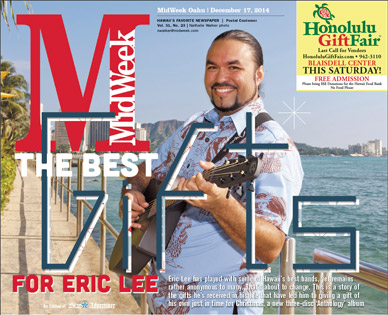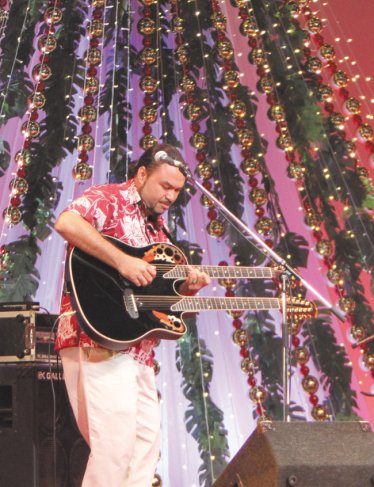The Best Gifts For Eric Lee
Eric Lee has played with some of Hawaii’s best bands, yet remains rather anonymous to many. That’s about to change. This is a story of the gifts he’s received in his life that have led him to giving a gift of his own just in time for Christmas, a new three-disc ‘Anthology’ album
Twenty years is a long time to be doing something. It’s an even longer time to be doing something really well.
mw-cover-121714-eric-lee-7
Singer-songwriter Eric Lee is one of those rare musicians who falls into that category. Like a great sustain note on a guitar, he’s been able to do his own thing so well and for so long that you sort of take him for granted. You kind of expect him to always be there to inspire you with his lyrics, soothe you with his melodies, wow you with his deft instrumental work. And then he goes and freaks you out by saying things like “It’s been such a wonderful ride” and “I want to make sure that before I leave …” and you start thinking, wait — where are you going?!
But then he quickly hands you a gift, his latest album called Anthology 1994-2014, and you suddenly realize that, whew, he’s not leaving you and his growing fanbase anytime soon. The accomplished eclectic artist best known for his work in the Hawaiian music category, but whose versatility allows him to comfortably play the blues, rock and country genres equally well, is simply reflecting on his rather productive career up to now. And what a career ride it’s been — from his days as a straight-outof-high-school ukulele wizard who was capturing Ka Himeni Ana and Na Hoku Hanohano awards, to his years of trading guitar licks and harmonies with the finest musicians around, including John, Jerome and a couple of guys named Moon.
In releasing his impressive three-disc album Anthology, Lee hopes to tell his story as a professional musician, which began with groups The Kanile‘a Collection, Na Kama, The Ka‘ala Boys, and Palani Vaughan and the King’s Own, and continues today as a solo artist and occasional performer with The Makaha Sons. Two of the album’s discs contain his most beloved compositions recorded with the aforementioned bands, including Ku‘u Pua Lehua (Na Kama) and Na Nalu Ha‘i O Ma‘ili (The Kanile‘a Collection, with guest artist Peter Moon). But they also feature three new tracks: Mahina’s Lullaby and Hali‘ali‘a Aloha, which were recorded with The Makaha Sons, and Ke Nani Mae ‘Ole, which spotlights Lee’s favorite singer, Robert Cazimero.
The album’s third disc, a DVD, contains video highlights of Lee’s journey, as told by him and others.
“Anthology is essentially a storybook of a few chapters of my life, and as I enter my mid-life years and before I leave (this earth), it’s important to me that I leave something behind about my work,” explains Lee, a 1992 graduate of Kamehameha Schools.
“At the same time, my story has been full of gifts from others. It’s like the marathon runner who has water stations at certain points to help him refuel and reach the next mile,” he continues. “So I think it’s important to tell others about the people who have helped me in my career. These are people who I guess saw that spirit and drive that I had for music, and they wanted to present me with gifts. They’d say, ‘Hey, let me share something with you. It might help you along the way.'”
In honor of the Christmas season, its timeless carols and well-known Nativity themes, MidWeekis recounting portions of Lee’s life here, and highlighting just a few of the best gifts he’s received — all of which have helped shape both his career and character and, as a result, “made me who I am today.”
A “Miraculous” Birth
Given the ease with which he handles the ukulele and guitar, you’d almost expect Lee to descend from a long line of musicians. And if you assumed as much, you’d be wrong. Generation after generation have come and gone, and the family tree has produced no known fruits of instrumentalists — that is, until a ripened Lee dropped from its branches. So when he inexplicably began showing signs of musical fire and aptitude as a youngster, you almost could see incredulous neighbors scratching their heads and wondering aloud, Isn’t this the electrician’s son?
The youngest of four children born to Eddie Lee Sr. and wife Claudette, Lee grew up on the west side of Oahu, in the small, laid-back town of Ma‘ili. His father initially worked for Kaiser Cement Corp. in Nanakuli before moving on to Kamehameha Schools, where he held an electrician’s job until his retirement a few years ago. His mother found employment at Arakawa’s and eventually landed a position within the Kamehameha Early Education Program, but took particular pride in the around-the-clock roles she served at home as dutiful wife and doting mother.
“Both of my parents were hard workers — my mom being the one who kept the house afloat and the kids in line, while my dad took care of the finances and provided sustenance for the family,” Lee fondly remembers. “They were also devout Catholics, who raised us to have good values and a good perspective on life. And the responsibility of going every Sunday (to church at Sacred Hearts Waianae) evolved into an awareness of responsibility as a I grew older.”
When he was about 7, Lee remembers attending a party with his parents and watching a live band cover the Iva Kinimaka classic He Aloha Mele while a woman danced a hula. The performance would mark a defining point in his life because it demonstrated the power of music and the almost mystical dynamic that can occur among musician, dancer and audience. In recalling this moment of musical genesis, Lee says, “It was kind of like a revelation to me. I had an awareness of what was happening, but I still wasn’t sure what it all really was. All I knew was there was something inside telling me that what I was seeing was a really cool thing, and that I wanted to be a part of that magic.”
In the months that followed, he would pass much of his free time listening to the radio, choosing to strengthen his growing interest in multiple genres of music rather than frolic in the surf breaks of Ma‘ili with his two brothers. Soon, Claudette Lee would help feed her son’s appetite for notes and melodies by signing him up for summer ukulele classes at church. On the way to Lee’s initial lesson, she made it a point to stop at Woolworth’s in Waianae just to purchase a $15 uke for her little shining star.
“It was basically a toy instrument with Suji strings on it, and it couldn’t hold a tune,” he says. But neither the playing flaws nor the economy of the model bothered Lee. What mattered most was that he finally had his first instrument and because of that, he would soon be creating a bit of his own magic.







